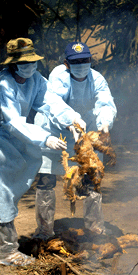Health and Human Security Programme

The risk of infectious disease pandemics is greater than in the past and the global public health response system faces serious analytic and institutional challenges. Infectious diseases have the potential to spread rapidly across national borders and effective response demands rapid and effective coordination between organizations, governments, and experts. Emergent networks of local, national, and international public health authorities, laboratories, and university research centers must often be cobbled together on a temporary and ad-hoc basis to respond to these emerging threats. Yet the epidemiology of emerging infectious diseases operates in a context of epistemic uncertainty and ambiguity. Information about the number and distribution of cases is rarely complete and little may be known about the disease itself and how it spreads. Confounding signals invariably complicate decision-making. Successful response requires geographically-dispersed networks to develop accurate interpretations of epidemiological information in time-pressured, uncertain and often politicized environments.
Given that information regarding possible disease outbreaks is vital in the monitoring, surveillance and control of infectious diseases, a core objective of this project is to enhance the capacity of the region to address the challenge of building a good mechanism for regional and domestic disease surveillance in order to develop and promote international regimes to avert health disasters. In this regard, the project not only aims to raise regional awareness of the serious threats of infectious diseases but more importantly to build linkages among different state agencies and policy communities in the region in order to develop an integrated approach in responding to health crises.
This project brings together an international, multidisciplinary team with experience in security studies, public health policy, and epidemiology to study how global response networks form and evolve and how these distributed communities interpret and make sense of infectious disease outbreaks.
Posted on: 28/4/2010 12:24:03 PM |
Topic: Health Security


